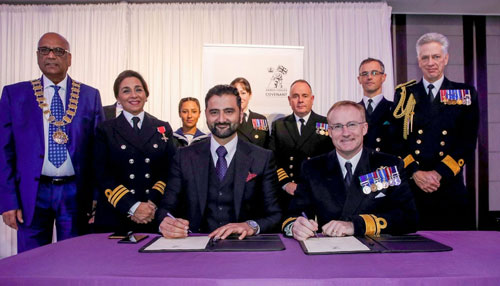London
A British Pakistani entrepreneur, who launched the One Million Meals campaign at the height of COVID-19 pandemic in the UK to feed hot meals to the National Health Service (NHS) workers, said that his project would continue serving the people facing the food crisis in the country even if the emergency caused by the pandemic has passed.
Raja Suleman Raza, who has been at the forefront of serving special Pakistani cuisine in the UK through his four restaurants and chains, has won appreciation in the BBC, SKY News, ITV, The Telegraph and many other titles for rising to the occasion and coming up with the unique initiative to help the NHS staff when the COVID-19 crisis gripped Britain and the medical staff struggled to cope with the rising number patients and casualties.
Rawalpindi-born Suleman Raza, who is founder of the Pakistani Restaurant Group Spice Village, was going through a crisis in early March 2020 due to the lockdown after the coronavirus pandemic struck the UK and everything was grounded to a halt, including his own business.
During the mid of March 2020, Raza, while rummaging through the scary stories of coronavirus victims, underwent some soul-searching moments and decided to utilise his previous experience of charitable work to help those in most need.
He had run a big campaign for the homeless under the title of ‘No One Eats Alone on the Christmas Day’ to serve hundreds of the homeless people on December 25, 2019, across all of his restaurants.
To begin with, he offered the vast establishment of Grand Sapphire Hotel & Banqueting to the NHS to set up an emergency hospital in Croydon.
Suleman assembled a team of volunteers to kickstart the whole initiative and volunteered his hotel rooms for them to stay as long as they were willing to work on the One Million Meals. The volunteers were also provided computers, laptops and phones to facilitate communication. In the first week, almost everyone was working around more than 60 hours, making frantic efforts to reach out to hospitals and vulnerable people facing the food crisis.
Suleman worked out a formula to reach out to the NHS trusts, hospitals, and units with the food demand, and then the demand was passed onto the local restaurant with good hygiene rating in the proximity. He was amazed at the response. While most of the restaurants were charging the bare minimum costs (around £5 per meal), they were still happy to collaborate and deliver meals as they found this offer as one ray of hope in the darker times of the Coronavirus pandemic.
He said: “Being a foodpreneur, I was aware of the catastrophic impact of the lockdown, and I am glad that we managed to serve thousands of meals through the local restaurants that geared up their businesses and got their operations going in these turbulent times.”
During the lockdown, fundraising was a challenging endeavour. Most of the businesses were shut down, and uncertainty prevailed. Suleman reached out to his vast network for support and donations while doing everything he could donate himself, resources, hotel rooms, storage spaces, industrial kitchen and parking spaces. He initiated campaign at GoFundMe that started gaining traction slowly.
The biggest support came from the celebrated footballer David Beckham who responded warmly to Raza’s appeal and announced backing the One Million Meals. Beckham’s support made headlines all over the world and put the campaign in the spotlight that worked wonders in opening many doors.
He added: “For me, it is a long-term commitment, even when the pandemic finishes. The Financial Time’s news report shares that more than three million people in the UK were going hungry due to the lockdown.
I am committed to serving the people facing the food crisis. I want to involve the restaurants all over the country in his next campaign to end homelessness and food deprivation from the UK.”—Agencies










